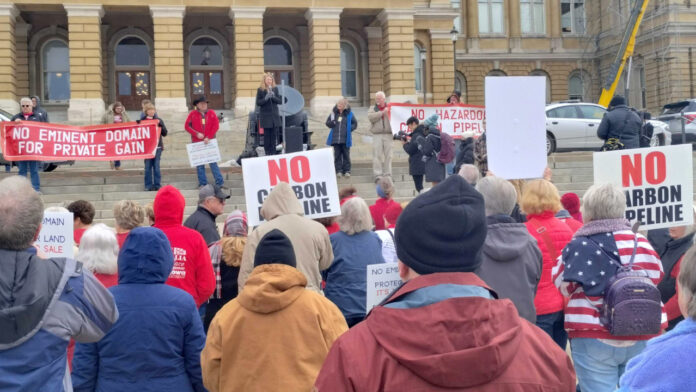
There isn’t enough support in the Iowa Senate to enact new legislation that would restrict eminent domain for three proposed carbon dioxide pipelines, the Republican leader of a Senate panel said Monday, Feb. 27.
“I don’t believe there’s a legislative answer to this, currently,” said Sen. Jason Schultz, R-Schleswig.
He was part of a Senate subcommittee on Monday that declined to approve a recently introduced bill that would prevent pipeline companies from using eminent domain without voluntary permission from two-thirds of landowners of the affected properties. The bill would also exempt current carbon dioxide pipeline proposals from that restriction.
Other legislation in the Senate that would either bar eminent domain for the pipelines or require voluntary easements for 90% of their routes has not been given a hearing despite being introduced more than a month ago.
“Most of Iowa doesn’t have a pipeline going through it, so those legislators aren’t hearing the same concerns,” Schultz said. “We have multiple reasons why it isn’t easy, and it’s been frustrating.”
Three companies want to build pipelines that would carry captured carbon dioxide away from the state’s ethanol plants for underground sequestration or other uses, including a proposal from Wolf Carbon Solutions that would traverse the southern portion of Linn County. The projects would lay more than 1,500 miles of pipe with the potential for further expansion.
There is no current threshold for how many land easements for the projects must be obtained voluntarily, and the companies have said changing the rules would be unfair because they have collectively spent hundreds of millions of dollars so far in pursuit of the projects under the current requirements.
Ethanol proponents have said the projects are essential to the future of the industry, but opponents argue that the projects are meant to benefit private companies and don’t serve a public use that is sufficient to force landowners to give permission for the pipelines to cross their land.
A bill in the Iowa House that would require 90% voluntary easements — among other restrictions for the projects — gained early support last week.
Senate File 346 was introduced last week and would require voluntary easements for at least two-thirds of affected parcels and two-thirds the total pipeline length to qualify for eminent domain.
One of the pipeline companies, Summit Carbon Solutions, has said it already has voluntary easement agreements for about 67% of its proposed route of roughly 680 miles in western and northern Iowa.
“I have no doubt we will easily get to 90, 95%,” said Jake Ketzner, vice president of government and public affairs for the company.
On Monday, the new eminent domain pipeline bill was widely panned by people on both sides of the issue. It does not target carbon dioxide pipelines specifically and would be applicable to other utility projects. Pipeline opponents said it doesn’t do enough to protect landowners.
“We need legislators to commit to protecting our land and to protect the safety of our families, our neighbors, our livestock, our wildlife and our environment,” said Cynthia Hansen, whose farm in Shelby County is in the path of Summit’s proposed pipeline.
Landowners and environmental groups worry that the construction of the pipelines will irreparably damage land and that potential pipeline failures pose significant risks to humans and animals. The carbon dioxide carried by the pipelines can remain close to the ground if it leaks and can envelope people. Dozens were sickened by a pipeline leak in Mississippi in 2020.
“I understand that pretty much everybody in this room, nobody likes this bill,” said Sen. Mike Klimesh, a Spillville Republican who led the subcommittee.
Most policy bills that do not include tax or spending provisions face a deadline this week to clear a full committee in the House or Senate. Bills that fail to meet the “funnel” deadline are generally considered ineligible for further debate, although they can be revived in various ways.
Originally published by Iowa Capital Dispatch. Reprinted with permission.




